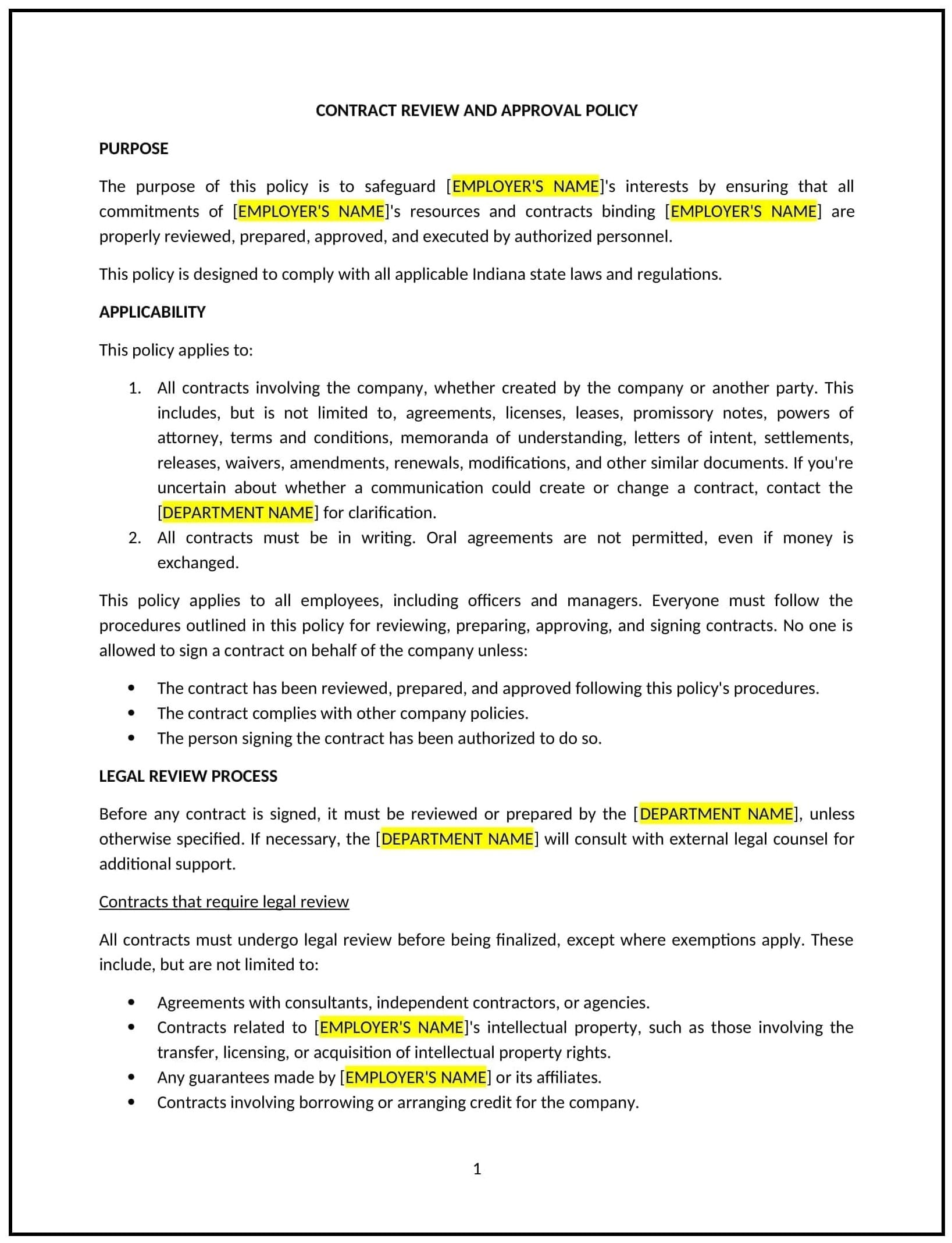Contract review and approval policy (Indiana): Free template
Got contracts to review? While you're here for policies, let Cobrief make contract review effortless—start your free review now.

Customize this template for free
Contract review and approval policy (Indiana): Free template
The contract review and approval policy helps Indiana businesses establish clear guidelines for reviewing and approving contracts to ensure compliance with legal, regulatory, and internal business standards. This policy outlines the steps involved in reviewing, negotiating, and approving contracts, including the roles of various stakeholders, approval workflows, and documentation requirements. By using this template, businesses can ensure that contracts are carefully reviewed, risks are mitigated, and the company is protected in all contractual agreements.
By implementing this policy, Indiana businesses can streamline their contract management process, reduce legal risks, and ensure that all contracts align with business objectives and comply with applicable laws.
How to use this contract review and approval policy (Indiana)
- Define contract types: Clearly specify the different types of contracts that require review and approval, such as vendor agreements, customer contracts, employment contracts, and non-disclosure agreements. The policy should clarify which contracts fall under this process and which may be handled differently.
- Establish review procedures: Outline the steps involved in reviewing contracts, including the identification of key terms and conditions, legal compliance checks, risk assessment, and alignment with company policies. The policy should specify which departments or individuals are responsible for reviewing contracts (e.g., legal team, finance, management).
- Set approval workflows: Define the workflow for contract approval, including the roles and responsibilities of stakeholders at each stage. This may include initial review, negotiation, final approval, and signature. Specify who has the authority to approve contracts at different levels, such as department heads, senior management, or legal counsel.
- Specify timelines: Outline the timelines for contract review and approval, setting expectations for how quickly contracts should be reviewed and approved. This helps ensure that contracts are finalized in a timely manner without unnecessary delays.
- Address contract amendments: The policy should specify how amendments to contracts should be handled, including the process for negotiating, documenting, and approving any changes to the original contract terms.
- Include documentation requirements: Define the documentation that must be attached to or included with contracts during the review and approval process, such as due diligence reports, risk assessments, or financial impact analyses. Ensure that all relevant supporting documents are reviewed and signed off on before the final approval.
- Comply with legal and regulatory requirements: Ensure that the contract review process aligns with applicable Indiana state laws, federal regulations, and industry-specific requirements. The policy should specify that all contracts must comply with legal standards and ethical business practices.
- Provide guidelines for electronic signatures: If applicable, specify the use of electronic signatures for contract execution, including any requirements for using secure platforms and ensuring that electronic signatures are legally valid.
Benefits of using this contract review and approval policy (Indiana)
Implementing this policy provides several key benefits for Indiana businesses:
- Reduces legal and financial risks: A structured contract review process helps businesses identify and mitigate potential risks, such as unfavorable terms, compliance violations, or unclear provisions, before contracts are finalized.
- Ensures legal compliance: The policy ensures that all contracts are reviewed for compliance with legal, regulatory, and internal business standards, minimizing the risk of non-compliance and legal disputes.
- Streamlines contract management: By defining clear review and approval workflows, businesses can manage contracts more efficiently, reducing bottlenecks and delays in the approval process.
- Protects company interests: The policy helps ensure that contracts align with business objectives, protect intellectual property, and safeguard company assets by ensuring all terms are thoroughly reviewed and negotiated.
- Enhances accountability and transparency: The approval process ensures that all stakeholders are accountable for their roles in the review and approval of contracts, promoting transparency and consistent decision-making across the organization.
- Promotes efficient contract execution: Clear guidelines for contract review and approval help businesses expedite the process, allowing for faster contract execution and improved business operations.
Tips for using this contract review and approval policy (Indiana)
- Communicate the policy clearly: Ensure that all employees, particularly those involved in contract negotiations or approvals, understand the contract review and approval policy. This should be included in the employee handbook and regularly communicated through training.
- Train employees on contract review: Provide training for employees involved in the contract review process to ensure they understand their responsibilities, recognize key contractual risks, and know how to follow the approval workflow.
- Use standardized templates: Consider using standardized contract templates to streamline the review process. Standard templates can reduce review time and ensure that key terms are consistently addressed in contracts.
- Track contract progress: Implement a tracking system to monitor the status of contracts as they move through the review and approval process. This helps ensure timely follow-up and prevents delays in contract execution.
- Review the policy periodically: Regularly review the contract review and approval policy to ensure it aligns with any changes in business practices, legal requirements, or industry standards.